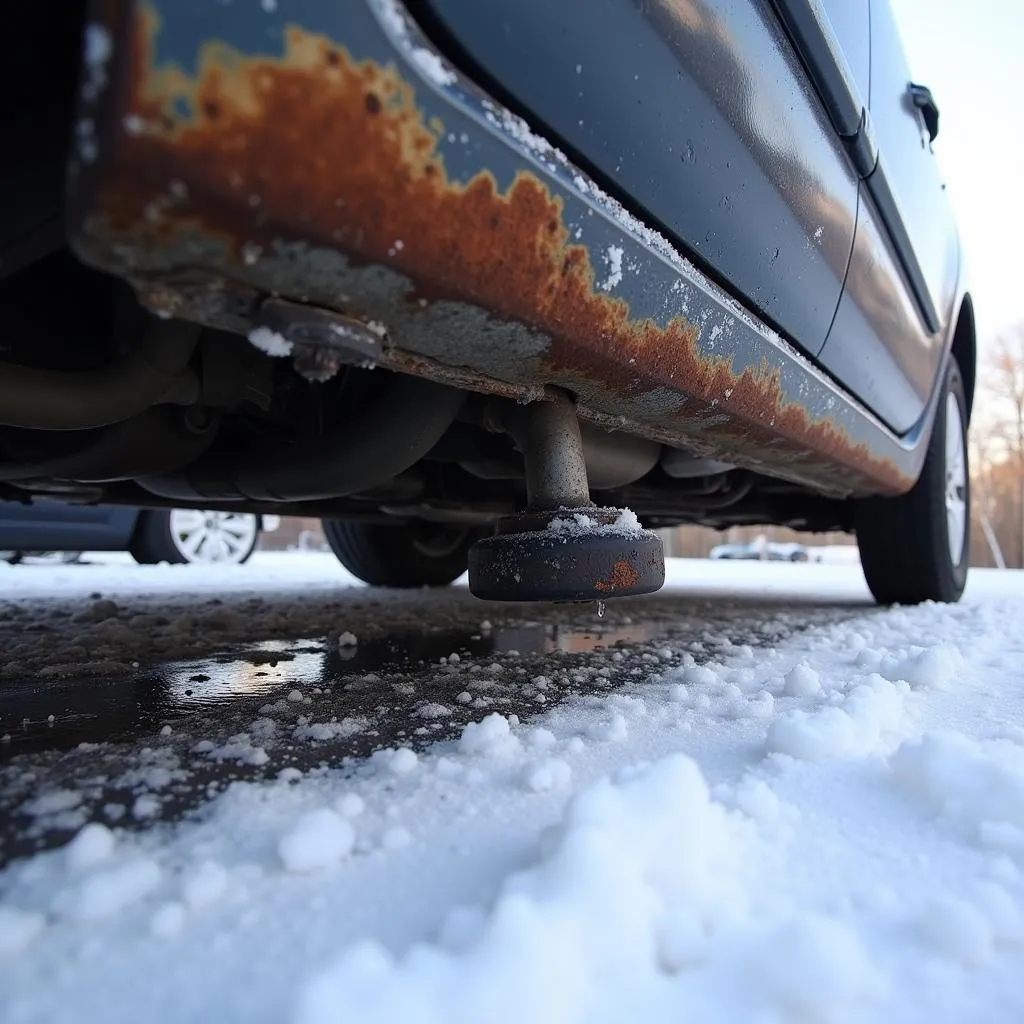Salt for Car: Everything You Need to Know
Salt is a common sight in the winter months, but did you know it can wreak havoc on your car? While salt helps keep roads safe by melting ice and snow, it can also lead to rust and corrosion, damaging your vehicle’s undercarriage, paint, and electrical components.
 Car Undercarriage Covered in Salt
Car Undercarriage Covered in Salt
Why Is Salt Bad for Cars?
Salt accelerates the rusting process by acting as an electrolyte. When salt dissolves in water, it creates a solution that conducts electricity. This solution allows electrons to flow more easily between two different metals, speeding up the electrochemical reaction that causes rust.
Effects of Salt on Different Car Parts:
- Body Panels: Salt can cause paint damage, leading to chips, scratches, and eventually, rust.
- Undercarriage: This area is most susceptible as it’s directly exposed to road salt. Rust on the undercarriage can weaken the structural integrity of your vehicle.
- Brakes: Salt can corrode brake lines and calipers, potentially leading to brake failure.
- Electrical System: Salt water can seep into electrical connections, causing shorts and malfunctions.
- Exhaust System: The exhaust system is susceptible to rust due to its exposure to salt and moisture.
How to Protect Your Car from Salt Damage
While you can’t completely avoid driving on salted roads during winter, you can take steps to minimize salt damage to your car:
- Regular Car Washes: This is crucial during winter. Wash your car frequently, including the undercarriage, to remove salt residue. Consider a specialized undercarriage wash for better protection.
- Waxing: Applying a coat of wax before winter creates a protective layer on your car’s paint, making it harder for salt to penetrate.
- Rubber Mats: Place rubber mats on the floor of your car to prevent salt from damaging the carpet and floorboards.
- Check and Clean Your Car Regularly: Inspect your car for any signs of rust or damage, particularly after driving in snowy or icy conditions. Pay close attention to the undercarriage and wheel wells.
 Car Wash During Winter
Car Wash During Winter
FAQs about Salt and Cars
Q: How often should I wash my car in the winter?
A: Aim to wash your car every two weeks, or more frequently if you regularly drive on salted roads.
Q: What type of car wash is best for removing salt?
A: Touchless car washes are generally better at removing salt as they use high-pressure water jets instead of brushes that can potentially grind salt into the paint.
Q: Can I wash my car when it’s freezing outside?
A: It’s best to wash your car when the temperature is above freezing to prevent water from freezing on your car and causing damage.
Q: Are there any alternatives to road salt?
A: Yes, there are alternatives like sand, beet juice, and cheese brine. However, each alternative has its own pros and cons, and road salt remains the most widely used de-icer.
Conclusion
Salt is a necessary evil during winter, but it doesn’t have to ruin your car. By understanding the potential damage salt can cause and taking preventative measures, you can keep your car looking and performing its best all winter long. Remember, regular maintenance and care are key to combating the corrosive effects of road salt.
For more information on car care and maintenance, check out our articles on salt life car tags and salt life decal for car.
 Mechanic Inspecting Car Undercarriage
Mechanic Inspecting Car Undercarriage
If you need assistance with car maintenance or repair, don’t hesitate to contact us. Our team of experts is available 24/7 to answer your questions and provide top-notch service. You can reach us via WhatsApp: +1(641)206-8880, Email: [email protected], or visit us at 276 Reock St, City of Orange, NJ 07050, United States.
